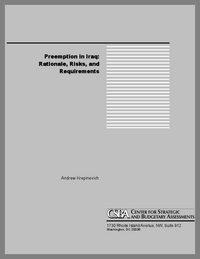
This report addresses the issue of the United States pursuing a preventive war (or what the Bush Administration has labeled “preemptive” war) against Iraq. Preventive wars and attacks are relatively rare in history, and for good reason. Any war is a risky proposition. Choosing to assume that risk by initiating conflict is something that states have done typically with great reluctance. Nevertheless, a strong case can be made for launching a preventive war against Iraq.
The dangers from Saddam Hussein are real. He does not appear to respond to American notions of deterrence and containment. He takes risks most senior US policymakers would consider reckless. He has used chemical weapons to kill thousands of Iranians, as well as thousands of his own people. Despite economic and political sanctions, he almost certainly has continued to pursue the development of weapons of mass destruction (WMD), including nuclear weapons. Moreover, it is not at all clear that the current sanctions regime, which was experiencing severe erosion prior to 9/11, will prevent him from achieving his goal. Nor is it clear that the current intrusive inspection regime, enabled by a major US diplomatic effort and show of military force, can be sustained beyond the near term.
Lastly, the Bush Administration has, for better or worse, put US credibility on the line, much as the Kennedy Administration did during the Cuban Missile Crisis when it publicly declared as unacceptable the Soviet move to place nuclear-armed missiles in Cuba. The administration’s public pronouncements add weight to the pressure on Saddam Hussein. However, they also could erode US credibility if Iraq is not clearly disarmed. In the administration’s parlance, the Iraqi regime must change its behavior or the United States will change it. Few objective observers believe the former is possible while Saddam Hussein is in charge.
On the other hand, despite the strong case that can be made for preventive war, it remains a difficult choice. There are a range of significant risks that will be incurred if the United States pursues that option. Among other things, the impact of such an attack on the war on terrorism is unclear. The Bush Administration argues that, given Iraqi links to some terrorist groups, defeating Saddam Hussein through a preventive war would help the administration win the war on terrorism. However, it is also possible that an attack on Iraq could prove to be a distraction from the broader war on terrorism, or that it could even increase the level of terrorist activity aimed at the United States. There is also a risk that launching a preventive war could set a precedent that could be misused by some other countries in future conflicts, or that such a war could create a backlash against the United States among some governments, possibly including some friends or even allies. In addition, there are a range of more strictly military challenges that might make a preventive war against Iraq difficult and dangerous.



























